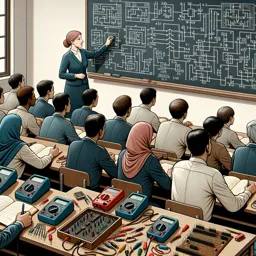Introduction to Advanced Electronics
Advanced electronics have become a cornerstone in the ever-evolving world of electrical systems and technology. For modern electricians, mastering specialized electronics skills opens doors to cutting-edge solutions, greater career prospects, and the ability to handle increasingly complex projects. This article delves into essential areas of advanced electronics, relevant training pathways, and the technical expertise electricians need to cultivate today.
Understanding Unique Challenges and Skills
As technology becomes more integrated into our daily lives, advanced electronics present new challenges requiring an in-depth understanding of components, circuitry, and logic systems. Electricians must now be proficient in:
- Microcontroller and Sensor Integration: Learning to configure and troubleshoot microcontrollers used in automation, smart homes, and industrial systems.
- Precision Soldering and PCB Repair: Developing skills for repairing and prototyping using surface-mount devices (SMD) and multilayer printed circuit boards (PCBs).
- Programmable Logic Controllers (PLCs): Gaining expertise in programming, installing, and maintaining PLCs essential for industrial automation.
- Diagnostics and Testing Equipment: Mastery in using oscilloscopes, logic analyzers, and advanced testing tools for effective troubleshooting.
Specialized Training for Advanced Electronics
Pursuing professional courses tailored to advanced electronics is crucial. These courses often feature:
- Hands-on laboratory work with modern electronics equipment
- Detailed modules on the latest electronics standards, safety, and compliance
- In-depth exploration of communication protocols such as CAN, I2C, and Ethernet for industrial and residential applications
- Project-based learning, enabling electricians to create, implement, and debug real-world digital and analog circuits
With practical training, electricians can confidently handle a range of advanced electronic scenarios, from smart building installations to renewable energy system integration.
Key Benefits of Advanced Electronics Expertise
Electricians with advanced electronics skills benefit from:
- Expanded Career Opportunities: Ability to work on innovative projects and access specialized roles in automation, energy, and technology sectors.
- Improved Safety and Efficiency: Deep knowledge of advanced systems helps prevent costly mistakes and ensures compliance with safety regulations.
- Higher Earning Potential: Advanced certifications and technical prowess are in high demand and command premium compensation.
Conclusion
Embracing advanced electronics is essential for electricians aiming to stay at the forefront of their field. With comprehensive training, hands-on experience, and continuous learning, professionals can effectively meet the needs of modern technology-driven environments and set themselves apart as industry leaders.































